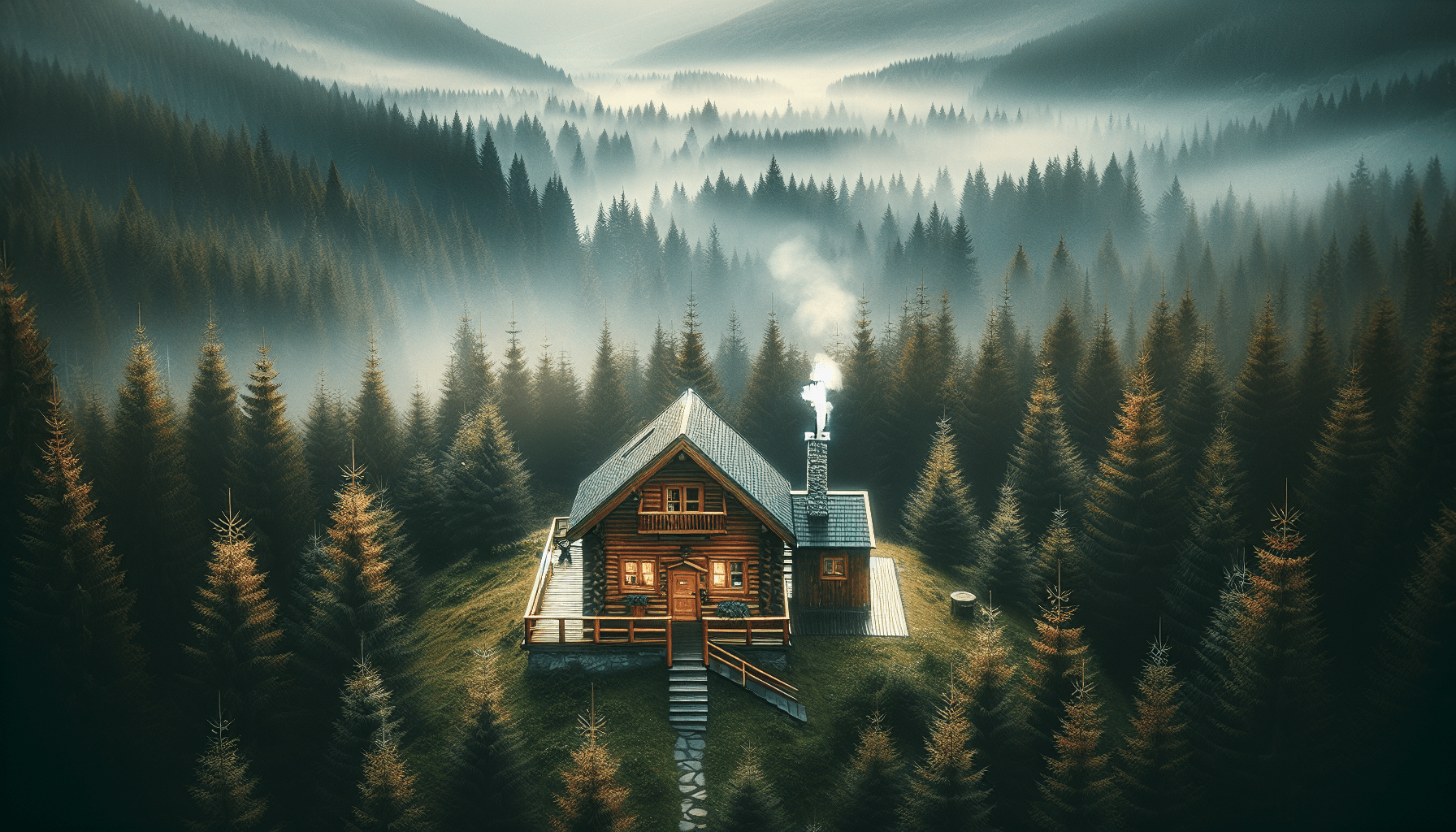
Starting a new life off the grid might seem like an adventurous and daunting task, but with careful planning and the right mindset, it can lead to a fulfilling and self-sufficient lifestyle. In “How Do I Start A New Life Off The Grid?” you’ll explore the initial steps needed to disconnect from modern conveniences, from choosing the perfect location to ensuring you have a reliable source of food and water. This guide will walk you through practical tips and considerations to help you embrace the simplicity and freedom of an off-grid existence, offering you not just survival, but a thriving and enriching way of living. Have you ever wondered what it would be like to leave the hustle and bustle of modern life behind and start fresh off the grid? You’re not alone. Many people dream of disconnecting from the fast-paced world we live in and embracing a simpler, more self-sufficient lifestyle. But where do you even begin? Starting a new life off the grid can seem daunting, but with the right preparation and guidance, it’s absolutely achievable.
What Does “Off the Grid” Mean?
Before diving into the steps to start a new life off the grid, it’s important to understand what “off the grid” actually means. Living off the grid refers to a lifestyle where you are not reliant on public utilities or services. This means generating your own energy, sourcing your own water, growing your own food, and living in a way that minimizes reliance on outside resources.
Self-Sufficiency and Independence
Living off the grid is fundamentally about self-sufficiency and independence. You are in control of your own resources, which can be incredibly freeing. This, however, comes with its own set of challenges. So, how do you start planning for this ambitious, yet rewarding lifestyle?
Planning Your Off-Grid Life
Proper planning is crucial for a successful transition to off-grid living. Jumping in without a plan can lead to problems down the line, so it’s essential to think through every aspect of your new life.
Assess Your Current Situation
First, take stock of your current situation. Consider your financial status, physical health, and existing skills. Moving off the grid requires an initial investment and a lot of hard work, so be realistic about your starting point.
Research and Education
Next, dedicate time to educating yourself. Read books, watch videos, and connect with others who have experience living off the grid. The more you know, the better equipped you’ll be to handle the unique challenges this lifestyle presents.
Choosing the Right Location
One of the most crucial decisions you’ll make is choosing the right location for your off-grid home. The location will impact your access to resources, your ability to generate energy, and the overall comfort and safety of your new life.
Climate Considerations
The climate of your chosen location is extremely important. It impacts everything from your energy needs to water availability and food production. For example, a tropical climate may make it easier to grow food year-round, but you’ll also need to consider the risk of hurricanes. Conversely, a colder climate might require more energy for heating.
Accessibility and Isolation
While you may want to be isolated, complete isolation can make life difficult. You’ll need access to supplies and emergency services. Finding a balance between isolation and accessibility is key.
| Factor | Pros | Cons |
|---|---|---|
| Proximity to Towns | Easier access to supplies | Less privacy |
| Remote Locations | More privacy, closer to nature | Potential difficulty in emergencies |

Energy Solutions
Living off the grid means you won’t have access to conventional electricity sources, so you’ll have to generate your own power. Fortunately, there are several renewable energy options to choose from.
Solar Power
Solar power is one of the most popular and effective ways to generate electricity off the grid. It requires an initial investment, but can provide a consistent and clean source of energy.
Wind Power
If you’re in an area with reliable wind patterns, wind turbines can be an excellent addition to your energy system. They can generate power most days and nights, regardless of weather conditions.
Hydropower
If your chosen location has a reliable water source, hydropower can be a constant and robust energy solution. However, it requires specific geographical conditions to be viable.
Water Sourcing and Management
Reliable access to clean water is another critical component of off-grid living. You won’t have the convenience of turning on a tap connected to a municipal water supply, so you’ll need to source and manage your own water.
Rainwater Harvesting
Collecting rainwater is a straightforward and effective way to ensure a steady water supply. You’ll need a collection system, storage tanks, and a filtration system to make the water safe for drinking and cooking.
Wells and Springs
If your property has access to a well or spring, this can be a reliable source of water. Wells require initial drilling and equipment, and they should be tested for contaminants.
Water Conservation
Regardless of your water source, conservation is essential. Use water-saving appliances, fix leaks promptly, and consider recycling greywater for purposes like irrigation to make the most of every drop.
Waste Management
Proper waste management is another key aspect of living off the grid. You’ll need to handle both human waste and other types of household waste in a way that is safe and environmentally friendly.
Composting Toilets
Composting toilets are a great solution for managing human waste off the grid. They transform waste into compost that can be safely used to enrich soil, reducing the need for synthetic fertilizers.
Waste Reduction and Recycling
Minimize the amount of waste you produce by focusing on reusables and recyclables. Compost organic kitchen waste, reuse containers, and limit single-use plastics to keep your environmental footprint small.

Food Production and Storage
Growing your own food is a major component of off-grid living. Not only does it reduce reliance on outside sources, but it also promotes a healthier lifestyle.
Gardening and Crop Selection
Start a garden and choose crops suitable for your climate and soil. Research what grows best in your area and plan your garden layout accordingly. Perennials, like fruit trees and berry bushes, provide long-term food sources, while annuals can be planted and harvested within a single growing season.
Raising Livestock
If you have the space and resources, raising livestock can provide a steady supply of meat, eggs, milk, and other animal products. Chickens, goats, and rabbits are popular choices for small off-grid homesteads.
Food Storage and Preservation
Proper food storage and preservation are essential to avoid waste. Techniques like canning, drying, fermenting, and freezing can extend the shelf life of your harvest and ensure you have a steady food supply year-round.
Building Your Off-Grid Home
Building an off-grid home is an exciting but challenging part of the process. Your home needs to be energy-efficient, comfortable, and suited to your climate.
Sustainable Building Materials
Choose sustainable, local building materials whenever possible. Options like straw bales, cob, adobe, and reclaimed wood reduce environmental impact and can often be sourced inexpensively.
Insulation and Ventilation
Proper insulation and ventilation are key to maintaining a comfortable temperature in your home. Insulate your home well to save on heating and cooling, and ensure good ventilation to maintain air quality and moisture levels.
Renewable Energy Systems
Incorporate your chosen renewable energy systems (solar, wind, hydropower) into your home design from the beginning. Plan for energy-efficient appliances and lighting to maximize the effectiveness of your power generation.
Financial Planning
While it’s possible to live off the grid on a budget, initial setup costs can be significant. Financial planning is crucial to ensure you can cover these costs and maintain your new lifestyle.
Initial Investment
Consider the cost of land, building materials, renewable energy systems, water sourcing, and other essentials. Create a detailed budget and consider ways to save money, such as buying used equipment or doing as much of the work yourself as possible.
Ongoing Costs
Even off the grid, you’ll have ongoing costs like maintenance, supplies, and property taxes. Budget for these expenses and consider ways to generate income, such as selling excess produce, crafts, or even hosting workshops on off-grid living.
Emergency Fund
It’s wise to have an emergency fund for unexpected expenses like medical emergencies, equipment repairs, or severe weather damage. Financial security will give you peace of mind in your new off-grid life.
Health and Safety
Maintaining your health and safety is paramount when living off the grid. Without immediate access to modern medical facilities, you’ll need to be prepared to handle basic health issues and emergencies on your own.
First Aid and Medical Supplies
Keep a well-stocked first aid kit and basic medical supplies on hand. Learn basic first aid and, if possible, take an advanced wilderness first aid course.
Physical Fitness
Living off the grid can be physically demanding. Regular exercise and a nutritious diet are important to maintain your strength and stamina.
Security Measures
While crime may be less of a concern in remote areas, it’s still wise to adopt basic security measures. Secure your property, keep communication devices charged and accessible, and develop a plan for emergency situations.
Community and Support Networks
Living off the grid doesn’t mean living in complete isolation. Building a community and support network can provide valuable resources, knowledge, and companionship.
Local Community
Get to know your local community. Attend farmers’ markets, community events, and workshops. Building relationships with neighbors can provide a sense of security and support.
Online Communities
There are many online communities dedicated to off-grid living. Participating in these can provide valuable advice, inspiration, and support from people who share your goals and challenges.
Legal and Regulatory Considerations
Before making the leap to off-grid living, familiarize yourself with the legal and regulatory considerations in your chosen area.
Zoning Laws and Permits
Check local zoning laws and building regulations to ensure your plans comply. You may need permits for building structures, drilling wells, or installing renewable energy systems.
Water Rights and Land Use
Understand your water rights and land-use regulations. In some areas, water rights can be complex and strict, so it’s important to know what you legally can and cannot do.
Waste Disposal Regulations
Proper disposal of waste is regulated in most areas to protect public health and the environment. Make sure your waste management plans meet local requirements.
Final Thoughts and Preparation
Starting a new life off the grid is a significant undertaking, but with careful planning, preparation, and a positive mindset, it can be one of the most rewarding experiences of your life.
Stay Flexible
Flexibility and adaptability are key. No matter how well you plan, unexpected challenges will arise. Stay open-minded and willing to adjust your plans as needed.
Continue Learning
Off-grid living is a continual learning process. Every season and year will bring new lessons and opportunities for improvement. Embrace the journey, learn from your experiences, and celebrate your successes.
In conclusion, starting a new life off the grid requires thorough planning, a solid understanding of your needs and limitations, and a willingness to learn and adapt. By carefully considering each aspect of off-grid living, from location and energy sources to food production and legal considerations, you can create a self-sufficient, sustainable lifestyle that not only meets your needs but enriches your life in ways unimaginable in the hustle and bustle of modern living. Go ahead, take that first step, and start planning for an extraordinary off-grid adventure!
